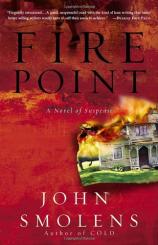Reading Group Guide
Discussion Questions
Fire Point

1. Pearly and Frank Colby's amicable working relationship as law breaker and law enforcer provides the only lightheartedness in the novel. Colby explains to Pearly that "all small towns need a Frank Colby, because all small towns have a Pearly Blankenship" (p. 18), and Pearly insists that "all small towns need a Pearly Blankenship, to make a Frank Colby necessary" (p. 20). How does this relationship figure into the plot of the novel? Does their easy connection benefit either of them in the end?
2. What motivates Suzanne to support Hannah in her decision to move in with Martin?
3. After the rape, Sean contemplates his wounds and reflects, "Burning the house to the ground wouldn't be enough. Not anymore. Somehow knowing this was comforting" (p. 120). What does he mean? What will be "enough"?
4. Why is Martin unable to enact retribution on Sean after he discovers the truth about the rape? Does his aversion to violence read as weakness, or strength of character? How does Sean explain it to himself?
5. After Martin is discovered bleeding in the driveway, the narrative of his rescue and its aftermath is interspersed with Pearly's tale of near-death in the waters of Lake Superior. Why does the author weave these disparate stories together? What lesson does Pearly take from his experience?
6. During the grand finale shootout, the most vitriolic hatred in the room seems to be not between Sean and Martin, or even between Hannah and Sean, but between Hannah and Frank Colby. How do you explain this?
7. From walking into an abandoned house with its door ajar to failing to report her rape to the police, Hannah's choices seem to reflect a lack of interest in self-defense. Given her background of damaging experiences, how do you read her attitude? Is her dishonesty with Martin an attempt to protect herself or him?
8. The novel opens with Pearly's point of view, closes with Hannah's point of view, and in between focuses largely on Hannah and Frank. Who is the main character? Who does the author seem to identify with the most?
9. What role does Mary Threefoot play in the windup to the fateful conclusion of the novel? Why does she warn Sean that he "won't see the stars from there" (p. 227) if he continues the course of action he's on? Why do her words resonate so profoundly with Sean, when nothing else has?
10. Pearly grapples with a deep envy of Martin: "Martin was making a life for himself, while Pearly was simply living the one he had been given. That old house was an achievement. . . . And then there was Hannah. . . . It seemed fitting that his cousin should get the house and the girl. Not get, earn. For Pearly, the man who had neither, the future seemed barren" (p. 183). What does Pearly do with this envy? Is Martin aware of it? Is Hannah?
11. The first page of the novel features Pearly contemplating how death has rendered his parents gruesome and foreign to him: "Sometimes Pearly believed he could see them both, his mother, crushed and bloodied beyond recognition, and his father, bloated and adrift in the deep, cold waters of Lake Superior." How does this set the tenor of the story? Why does the author choose this particular thought process as the entrée into the novel?
12. What instigates Frank's transformation from world-weary cop and disgruntled father to calculating killer?
Fire Point
- Publication Date: July 26, 2005
- Paperback: 304 pages
- Publisher: Three Rivers Press
- ISBN-10: 1400083230
- ISBN-13: 9781400083237







